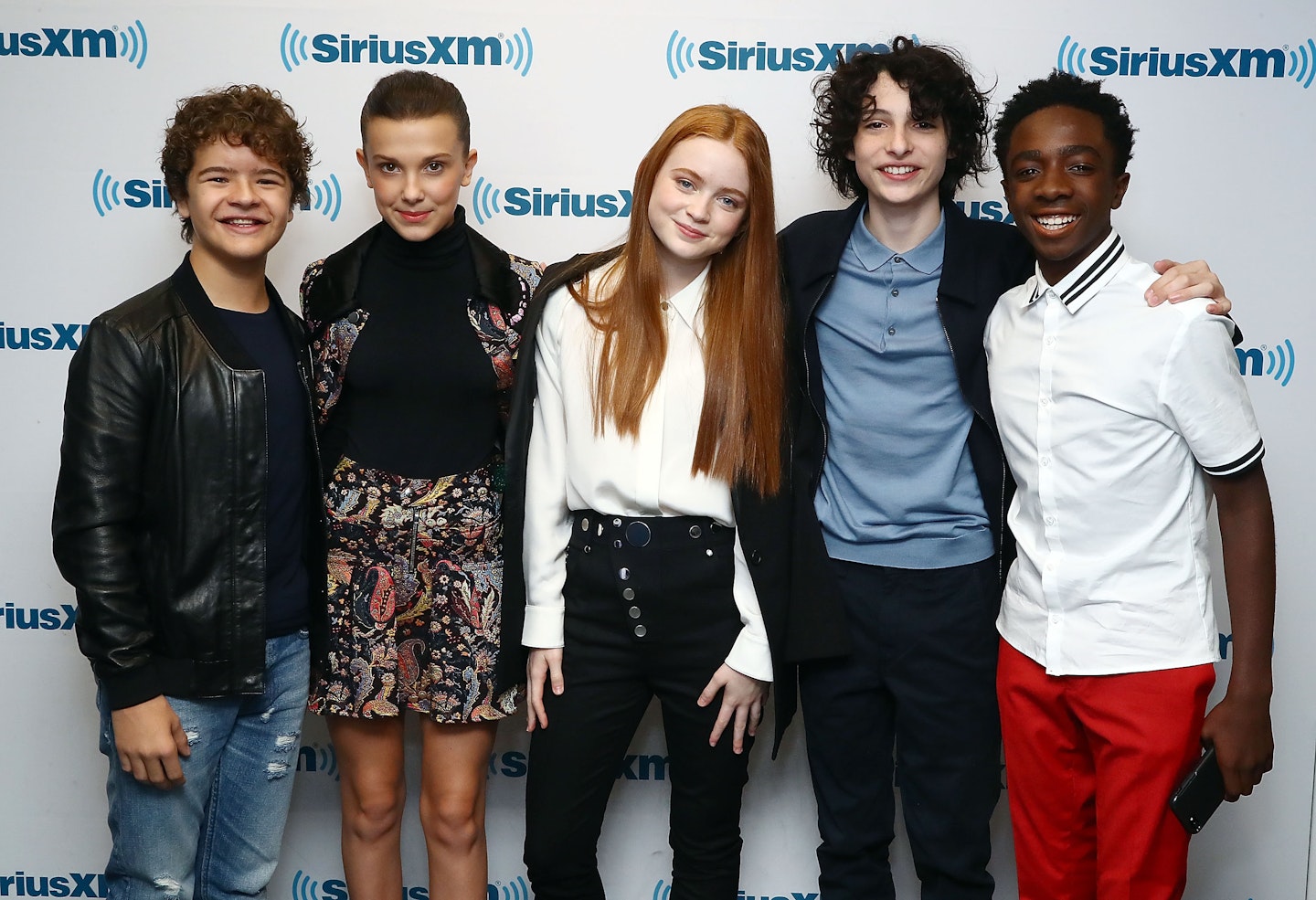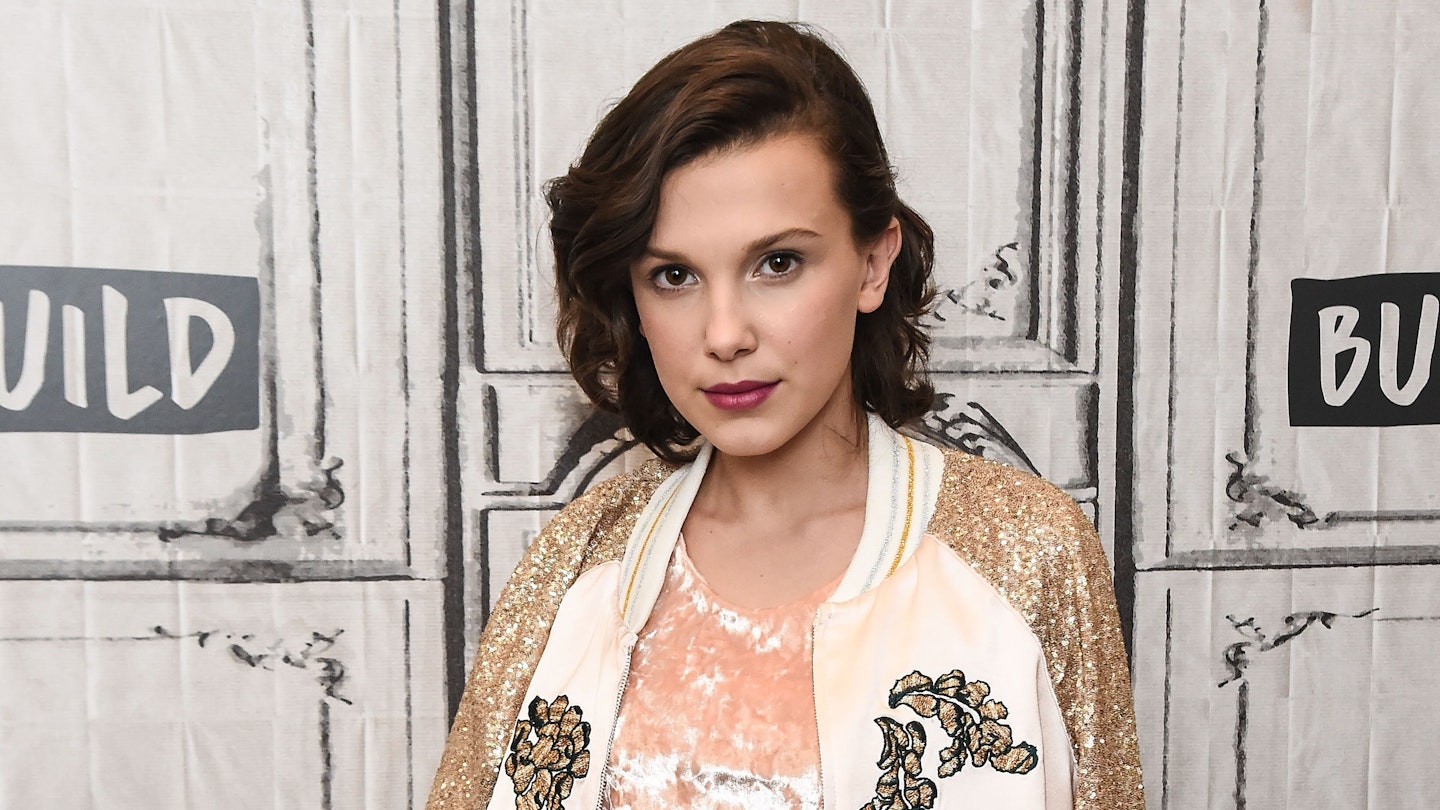There are few more effective antidotes to the troubled times we live in than Stranger Things. A slice of pure nostalgia for a more innocent era – of massive hair and Cyndi Lauper and, erm, alien-like creatures trying to take over Earth – the brilliant, ’80s-set cult Netflix series has been exactly the escapist treat we’ve needed this past couple of years.
But with the arrival of the second season, there’s been an undeniable change in the way its talented teenage stars are being talked about. After season one, released in 2016, the cute cast were met with ‘awws’. Now they’re a couple of years older, the language that’s used about them has started to spill over into something less innocuous. In some cases, it’s been positively, and inappropriately, sexual.
Millie Bobby Brown, aka Eleven, the 13-year-old British star of the show, bears the brunt of the sexualisation. This month alone, she was included in W magazine’s list of actors making ‘TV sexier than ever’, made the subject of a meme about how she ‘is only 13, but looks like she has her entire life figured out, and had her 'distinctly adult Calvin Klein leather dress' critiqued in tabloids.
No thought seems to have been given to how Millie, a young girl navigating life in the public eye after shooting to fame playing a girl with telekinetic powers, might feel about the assumptions being made about her. The rest of the young cast are also regularly the subject of inappropriate comments online, such as ‘you’re going to look good when you’re older’, and ‘shipping’, where fans imagine the characters in sexual contexts with each other.
The purveyors say they aren’t intending to cause harm and offence. Many, such as NBC executive Mike Sington, who tweeted about Millie ‘growing up in front of our eyes’, have even apologised. But that doesn’t take away from what they’ve done: perpetuate a culture where it’s OK to make adult remarks about a child.

Last week, 27-year-old model Ali Michael was met with a backlash when she shared a photo of 14-year-old Finn Wolfhard, who plays Mike, on Instagram, writing, ‘Not to be weird, but hit me up in four years.’ While Ali is a grown woman, Finn is a boy. There is a 13-year age gap between them and, while that’s no issue in consenting adult relationships, it’s disturbing when it involves a child – because, though Ali appears to have forgotten this, that’s exactly what he is.
The model was forced to apologise for her ‘insensitive’ comment and defended it as a ‘complete, absolute joke’. When asked about it, Finn struggled to find words: ‘That was nuts... gross. That’s good she apologised. It’s weird, but... it’s fine.’ His confusion was understandable. What’s more, ‘jokes’ likes these have the potential to cause lasting damage, as former child stars can attest to.
Mara Wilson, who was catapulted to fame playing the lead in the film Matilda, aged five, has spoken out about being sexualised in her teens by fans with ‘I love your legs’ and ‘see[ing] producers and famous actors make inappropriate comments’ on set in the ’90s. Now 30, she says she ‘felt sick, and then furious’ to see the messages circulating around Millie, because ‘a 13-year-old girl is not “all grown up”.’ Singer Charlotte Church grew up in the public eye and was forced to see descriptions of her ‘chest swell’ and sex life in the British tabloids – all while the music industry ‘pressured her’ to wear ‘more revealing’ clothes. It’s no surprise she now talks about the harm it has done.
Today, social media gives fans a platform to comment on young stars they’ve never previously had. Celebrities are often contractually obliged to use social media, making it difficult to avoid seeing what’s being said about them; inevitably, it also makes them more conscious of their public image. If they’re very young, this is bound to affect their self-esteem. Drew Barrymore, who found fame in ET, aged seven, had a stint in rehab at 13 and attempted suicide at 14. She has said, ‘I don’t like the idea of young girls growing up with social media; I know how sensitive they are.’
Millie Bobby Brown is already modelling for Calvin Klein and Converse, and she shares her fashion – from brands including Gucci and Burberry – on Instagram, to fans of all ages who lap up every piece of information about her. But if we’re treating a 13-year-old girl as a fashion icon, aren’t we all complicit in forcing her to grow up too soon? Surely she and every other child celebrity should be allowed to be a kid for as long as they deserve, without anybody scrutinising their clothes, hair and body or speculating on their love life. Otherwise, to some extent, aren’t we all responsible?
READ MORE: Why Do We Treat 30 As If We're About To Die At 35?
